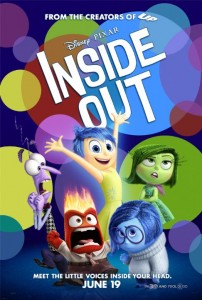7/12/15 blog post
3 big lessons for parents from "Inside Out"
“Inside Out” is a delightful movie focusing on the role of emotions in the life of an engaging eleven-year-old girl. The story is about how our emotions are messages to be understood and managed, rather than denied or rejected.
Eleven-year-old Riley confronts some significant challenges when her family moves from Minnesota to San Francisco. This dramatic change in lifestyle elicits strong emotions ranging from sadness to anger. Riley’s dilemma is the same faced by the rest of us. How do we decipher and deal with our feelings?
Psychologists refer to this as emotional intelligence (EI), the ability to recognize and deal with your feelings and those of others. People with high EI tend to be successful in their professional lives and have meaningful relationships with others.
What I really enjoyed about this movie was the recognition that even uncomfortable emotions have value. In our longing to maximize our happiness, many kids tend to deny feelings of sadness, anxiety, or guilt. No one intentionally seeks out these unpleasant feelings. However, these emotions have meaning for us.
How can we help kids understand their feelings and use them as a guide?
- Get the right name. Young people lack the verbal sophistication to appropriately identify such emotions of anxiety, guilt, or confusion. Until around the age of seven, most kids simply label their feelings as sad, mad, or happy.
- Value Emotional Intelligence. We spend an inordinate amount of time preparing kids academically for adulthood. However, EI skills are just as critical to their success. Talk about this stuff when you read bedtime stories to your young children. As your kids mature, don’t be reluctant to relate incidents about how you deal with your own emotions at work. Help them develop a more nuanced understanding of how even uncomfortable feelings have value.
- Understand the connections between our feelings and our behaviors. Don’t let kids use their emotional states as the reasons for their bad behaviors. “I hit Jane because I got mad” is a pseudo-explanation I hear frequently in my office. There is no denying that people act on their feelings. I’m more apt to say or do something inappropriate when I’m in an intense emotional state.
However, my feelings of anger didn’t cause my misbehavior. My lack of self-control is what’s really responsible for my wrongdoing. Our message to kids should be that that our feelings are okay. What’s important is how you understand and deal with those feelings.
Spoiler alert! Bring some tissues to this movie. They were needed by both me and my teenage daughter as we watched how Riley’s feelings of sadness brought her closer to her family.


